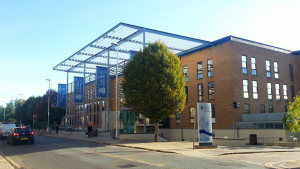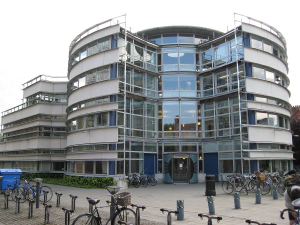Author: Emma Hecht
Location: Cambridge, England
Pronouns: She/Her/Hers
The education system here in England is extremely different from what we’re used to in the United States. I attend two different schools: the University of Cambridge and Anglia Ruskin. The University of Cambridge is made up of thirty-one colleges, each with their own dormitories, libraries, and classrooms. Each student accepted to the university is part of one and only one college, such as Kings or Trinity. However, students from each college sit in lectures together, which are not held at any college in particular, but on a different part of campus in buildings of lecture halls. The lectures are typically small, about twenty students, but can be up to around two-hundred. The lecturer basically just walks into class, gives a speech, leaves, and class is over. After the big community lecture, the students go back to their respective colleges and meet with a tutor (a different professor that belongs to their college), which is the person that facilitates a discussion about the class. These meeting might be one on one or in a very small group. Students will turn in all their course work to this tutor, not the lecturer. Speaking of course work, English professors do not assign coursework for a grade during the semester. The only thing that is due for the entire semester is a substantial paper at the end that expresses some sort of knowledge regarding an aspect of the course. There are recommended readings each week, but no quizzes, exams, or in class discussions of what you read. You can choose to read what’s recommended, read something different, or not read at all. Since Valpo students can’t belong to one of the thirty-one colleges, we get access to our Cambridge classes through the Westfield House, the building next door to our house, which is part of the Cambridge University Theological Federation. It’s like a Lutheran seminary that is connected to the lecture halls of Cambridge. So, Valpo students can have lectures in the Cambridge lecture halls, and then we come back to the Westfield House and meet with our tutor (e.g.—I sit in a twenty-five person lecture at the Faculty of Divinity lecture hall for my Sociology of Religion class and then come back to Westfield and meet with Dr. Gunjevic and two other Valpo students to talk over readings and decide on our paper topics). My classes at Anglia Ruskin are similar to Cambridge, but much more relaxed. It’s a small school like Valpo, where my classes (Database Design, Writing Poetry, and Prose Fiction) consist of ten to twenty students. Like Cambridge, there is only one assignment, due at the end of the semester (some of them due after the semester end at the beginning of January). Because they only assign one cumulative assessment, each class typically just once a week for two hours. For these classes, you have to “tap in,” which means you tap your student ID on a little electronic device on the wall inside the door that takes attendance. Even though Anglia uses this system to track exactly how many classes you attend, many students skip classes. But if you study abroad here, you are not allowed to skip more than two, or you get sent back to the States.

Anglia Ruskin University (where I take 3 classes)

Faculty of Divinity, Cambridge University (where I have my lecture once a week)
Leave a Reply